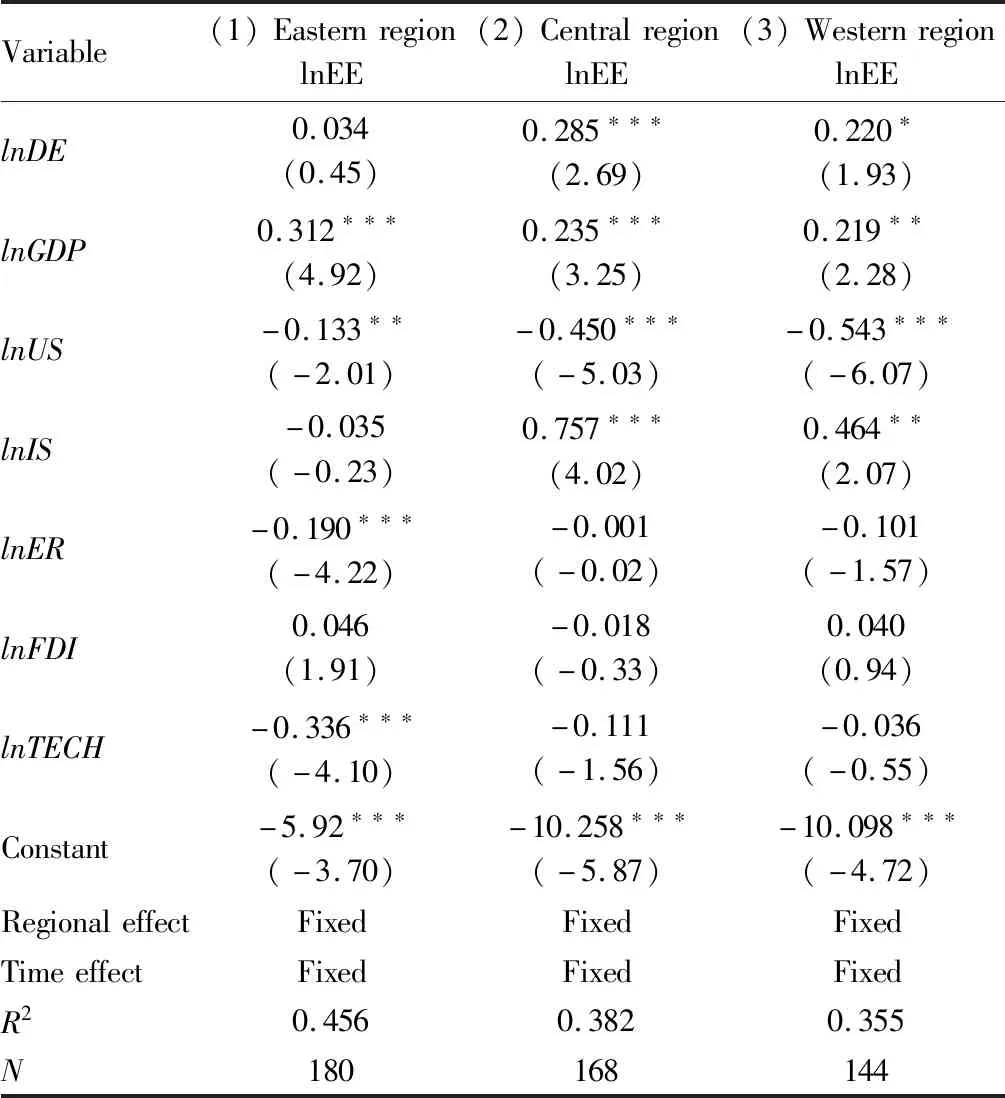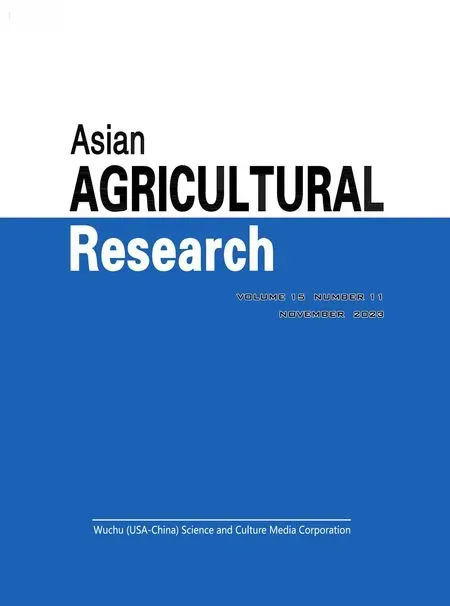Measurement of Digital Economy Development Level in Yangtze River Delta and Its Influence on Ecological Efficiency
2023-12-01QingQIAO
Qing QIAO
College of City Construction, Jiangxi Normal University, Nanchang 330022, China
Abstract Based on the panel data of 41 cities in the Yangtze River Delta from 2007 to 2018, this paper empirically tests the impact of digital economy development on urban ecological efficiency in the Yangtze River Delta. The results show that the development level of digital economy in Yangtze River Delta urban agglomeration is fluctuating and rising; the development of digital economy has a significant positive role in promoting the improvement of urban ecological efficiency; there is significant regional heterogeneity in the promotion of ecological efficiency by digital economy, especially in central cities.
Key words Yangtze River Delta urban agglomeration, Digital economy, Ecological efficiency
1 Introduction
Ecological efficiency has become an important index to measure the green development in the process of changing the current economic development from the extensive mode of pursuing growth rate to the connotative mode of pursuing structural adjustment and environmental efficiency[1]. Related research mainly focuses on the macro research level such as industrial development and social effects, and the micro research level such as production factors and technological updating. However, there are few papers to analyze the synergistic relationship between the development of regional digital economy and the improvement of ecological efficiency. In view of this, this paper takes the development of digital economy in 41 cities in Yangtze River Delta from 2007 to 2018 as the research object, and studies its impact on urban ecological efficiency.
2 Measurement of digital economy development level in Yangtze River Delta
2.1IndexsystemReferring to the existing research and based on the availability and representativeness of data[2-4], this study intends to construct a comprehensive index system for measuring the development of digital economy from three levels: digital infrastructure, digital industry foundation and digital environment support (Table 1).
2.2DevelopmentlevelofdigitaleconomyIt can be seen from Fig.1 that the overall development level of digital economy in the Yangtze River Delta is increasing year by year during the study period, from 0.198 in 2007 to 0.878 in 2018, with an average annual change rate of 16%, and the development level of digital economy is significantly improved.

Fig.1 Time series changes of digital economy development level in Yangtze River Delta urban agglomeration from 2007 to 2018
3 Influence of digital economy on ecological efficiency in Yangtze River Delta
3.1ModelsettingIn order to test the influence of urban digital economy development on ecological efficiency, this paper constructs the following panel model:
lnEEit=β0+β1lnDEit+β2Xit+μi+λt+εit
whereirepresents the city,trepresents the year,EEitrepresents the ecological efficiency of cityiin periodt,DEitrepresents the digital economy development level of cityiin periodt,μiandλtare regional fixed effect and time fixed effect, respectively, andεitis random error term.
3.2Variabledefinition
3.2.1Explained variable. The explained variable is ecological efficiency (EE). Referring to the existing literature, this paper establishes the following ecological efficiency evaluation index system (Table 2), and uses the super-efficiency SBM model to measure the ecological efficiency of 41 cities in the Yangtze River Delta region from 2007 to 2018. With regard to capital elements, this paper uses perpetual inventory method to estimate the actual capital stock of each prefecture-level city, that is, the total investment in fixed assets in the initial year is divided by 10% as the base period capital stock, and the depreciation rate is 9.6%.

Table 1 Evaluation index system of digital economy development

Table 2 Ecological efficiency evaluation index system of Yangtze River Delta urban agglomeration
3.2.2Explanatory variable. The explanatory variable is the development level of digital economy (DE).
3.2.3Control variable. Based on the existing literature, this paper selects the following control variables: economic development level (GDP); urban size (US); industrial structure (IS); scientific and technological level (TECH); level of opening to the outside world (FDI); government environmental regulation (ER).
3.3DatasourcesThe above data are all fromChinaUrbanStatisticalYearbook,ChinaRegionalEconomicStatisticalYearbook,ChinaEnvironmentalStatisticalYearbook,ChinaEconomicandSocialBigDataResearchPlatform, EPS database and statistical yearbooks of prefecture-level cities over the years. For some missing data, linear interpolation method is used to supplement them.
3.4Empiricalresultsandanalysis
3.4.1Baseline regression analysis. The regression results show that the coefficient of digital economy development level after cluster robustness adjustment is positive, and after adding control variables, the regression coefficient of digital economy development level rises from 0.261 3 to 0.273 3, significantly positive at the level of 1%, indicating that the development of digital economy is beneficial to the improvement of urban ecological efficiency. From the estimation results of control variables, the regression coefficients of economic development level, industrial structure and foreign investment are significantly positive.
Urban size, environmental regulation and ecological efficiency are significantly negative at the level of 1% and 5%, respectively. The regression coefficient of scientific and technological development is significantly negative, indicating that technological progress will inhibit the improvement of urban ecological efficiency in the Yangtze River Delta.

Table 3 Influence of digital economy on ecological efficiency (benchmark regression)
3.4.2Regional heterogeneity analysis. In order to test the regional heterogeneity of influence, this paper breaks through the administrative boundary and divides 41 cities in the Yangtze River Delta into three regions (eastern, central and western) for grouping regression test (Table 4).
According to the regression results, the influence of digital economy development level on ecological efficiency in Yangtze River Delta region shows significant regional heterogeneity. The development level coefficients of digital economy in central and western regions are significantly positive, while the estimation coefficient of digital economy development level in eastern region is positive but not significant.

Table 4 Heterogeneity test of influence of digital economy on ecological efficiency in three regional cities
3.4.3Robustness test. (i) Replace digital economy variables. This paper further refers to Zhao Tao, Huang Huiqun and other scholars[5-6], and chooses to re-measure the development level of digital economy with the development level of Internet. According to the regression results, although there are slight differences in parameter estimates between the recalculated digital economy index and the original digital economy development level, the signs between parameter estimates have not changed, and they are all significant at the level of 1%. Therefore, the regression results can be considered to be robust.
(ii) Eliminate the influence of municipalities directly under the Central government. In the course of research, this paper finds that compared with the other 40 prefecture-level cities, Shanghai’s digital economy development level and ecological efficiency are on the high side. Considering that if there are great values in the samples, the overall regression results may be biased. In order to make the samples more comparable and enhance the robustness of the test conclusions, Shanghai is excluded for test. After Shanghai is excluded, the conclusion that the development of digital economy in the Yangtze River Delta can improve ecological efficiency is still valid.
4 Conclusions
Based on the panel data of 41 cities in the Yangtze River Delta from 2007 to 2018, this paper measures the development level of digital economy in this region, and empirically tests the impact of digital economy development on urban ecological efficiency in the Yangtze River Delta. The specific conclusions are as follows:
(i) On the whole, the development level of digital economy in the Yangtze River Delta urban agglomeration showed an obvious upward trend from 2007 to 2018. (ii) The development of digital economy can obviously promote the improvement of urban ecological efficiency. Economic development level, industrial structure upgrading and foreign investment play a significant positive role in improving ecological efficiency, while urban scale expansion, environmental regulation and scientific and technological development cannot effectively improve urban ecological efficiency. (iii) There is significant regional heterogeneity in the impact of digital economy on ecological efficiency in the Yangtze River Delta, and its impact on ecological efficiency is the most significant in the central region, followed by the western region and it is the least significant in the eastern region.
5 Policy recommendations
Based on the above conclusions, this paper puts forward the following policy recommendations for the development of digital economy in the Yangtze River Delta and its impact on ecological efficiency: first, we should create new advantages in the digital economy and expand new space for economic development, accelerate the development of new generation digital technologies such as cloud computing, artificial intelligence and blockchain, consolidate the foundation of digital economy development in the Yangtze River Delta region, and promote high-quality economic development; second, we should break down the barriers to the development of digital economy between regions and attach importance to areas with weak foundation for the development of digital economy.
杂志排行
Asian Agricultural Research的其它文章
- Study on Adaptability of Introduced Pear Varieties
- Requirements and Safeguard Measures for Using Soil Fertilizer in Organic Agriculture: A Case Study of Fushun City in Liaoning Province
- Intellectual Property Protection, Inheritance, Innovation and Development of Woody Edible Oilseeds in Hubei Province
- Pesticide Residue Content in Vegetable Bases of Lhasa City
- Current Implementation and Experience of Natural Farming in Japan
- Teaching Reform of Fundamentals of Combustion for Energy and Power Engineering Majors in Agricultural Colleges and Universities in the Context of New Engineering Course
